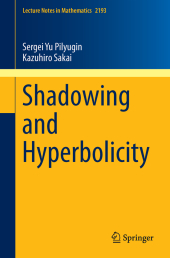 Neuerscheinungen 2017Stand: 2020-02-01 |
Schnellsuche
ISBN/Stichwort/Autor
|
Herderstraße 10
10625 Berlin
Tel.: 030 315 714 16
Fax 030 315 714 14
info@buchspektrum.de |

Sergei Yu Pilyugin, Kazuhiro Sakai
(Beteiligte)
Shadowing and Hyperbolicity
1st ed. 2017. 2017. xiv, 218 S. 5 SW-Abb. 235 mm
Verlag/Jahr: SPRINGER, BERLIN; SPRINGER INTERNATIONAL PUBLISHING 2017
ISBN: 3-319-65183-8 (3319651838)
Neue ISBN: 978-3-319-65183-5 (9783319651835)
Preis und Lieferzeit: Bitte klicken
Focusing on the theory of shadowing of approximate trajectories (pseudotrajectories) of dynamical systems, this book surveys recent progress in establishing relations between shadowing and such basic notions from the classical theory of structural stability as hyperbolicity and transversality.
Special attention is given to the study of "quantitative" shadowing properties, such as Lipschitz shadowing (it is shown that this property is equivalent to structural stability both for diffeomorphisms and smooth flows), and to the passage to robust shadowing (which is also equivalent to structural stability in the case of diffeomorphisms, while the situation becomes more complicated in the case of flows).
Relations between the shadowing property of diffeomorphisms on their chain transitive sets and the hyperbolicity of such sets are also described.
The book will allow young researchers in the field of dynamical systems to gain a better understanding of new ideas in the global qualitative theory. It will also be of interest to specialists in dynamical systems and their applications.
Preface.- 1 Main Definitions and Basic Results.- Lipschitz and H older Shadowing and Structural Stability.- 3 C1 interiors of Sets of Systems with Various Shadowing Properties.- 4 Chain Transitive Sets and Shadowing.- References.- Index.
"This book gives an up-to-date account of results on the relations between shadowing and such basic notions from the classical theory of structural stability as hyperbolicity and transversality. ... The style of presentation is very clear and, in my opinion, the book is quite suitable for researchers in the field of dynamical systems to understand the global qualitative theory from different points of view." (Yujun Zhu, Mathematical Reviews, July, 2018)


